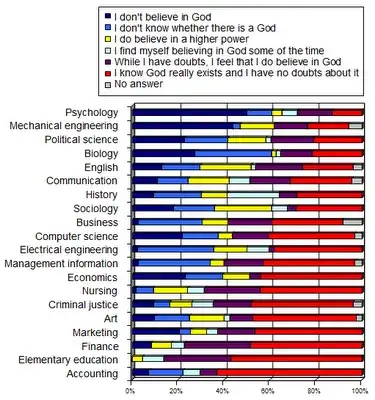Recent Slashdot article:
In a forthcoming book, Engineers of Jihad, published by Princeton University Press, Diego Gambetta and Steffen Hertog provide a new theory explaining why engineers seem unusually prone to become involved in terrorist organizations. They say it's caused by the way engineers think about the world. Survey data indicates engineering faculty at universities are far more likely to be conservative than people with other degrees, and far more likely to be religious. They are seven times as likely to be both religious and conservative as social scientists.
I am surprised, I believed engineers were far less religious than average (be it in the faculty population or general population).
I haven't found the "survey data" the article talks about, but does it really indicate that? If the data is not available, do other studies confirm/invalidate this affirmation?
